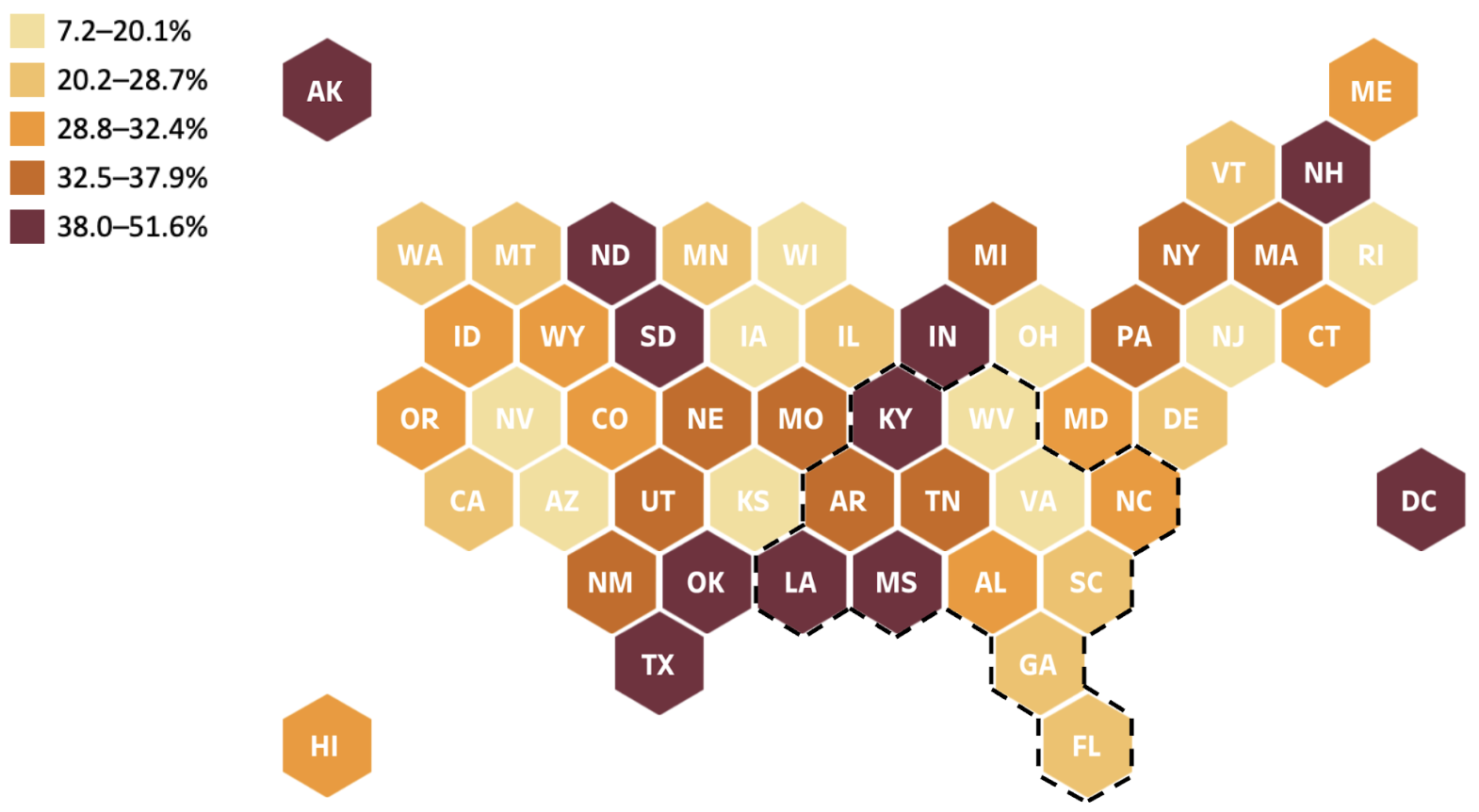Likelihood of eviction or foreclosure, by state
30% of Americans who are late on their rent or mortgage said they feared eviction or foreclosure. In MS and LA, 50% of these adults feared losing their home– the highest rates in the nation.
Likelihood of eviction or foreclosure, October 18–30, 2023
Percent of adults living in households not current on rent or mortgage where eviction or foreclosure in the next two months is “very likely” or “somewhat likely”
As extreme weather events become more frequent in the U.S., the fear of eviction or foreclosure looms for many Americans. In the South, 29% of adults who were past-due on rent or mortgage feared that eviction or foreclosure was likely. Among Southern states, fears are highest in MS (52%), LA (50%), and KY (43%). Fears of eviction and foreclosure are substantiated by the rise in climate-related evictions, the rising cost of home insurance (Cost of Flood Insurance), and home insurance companies removing coverage from disaster-prone regions.1,2,3 A 2021 study found a significant rise in evictions the year of and the year after an extreme weather event, with high cost burdens playing a large role (Unaffordable Housing).[4],[5] Counties receiving more aid per household from FEMA experienced fewer evictions within two years of a weather disaster. A separate study found that places with landlord-friendly laws had a sharp increase in evictions after a disaster, regardless of whether tenant protections were in place.[6]
Addressing climate change in the housing sector using a multi-pillar approach is crucial in ensuring community resilience. Federal legislation such as the Inflation Reduction Act and the Bipartisan Infrastructure Law present an opportunity to improve the resilience and sustainability for housing across the nation (Home Weatherization).
Chilkuri, S. (2023, November 30). Why renters struggle more in the wake of hurricanes. Louisiana Illuminator. https://lailluminator.com/2023/11/30/renters-hurricanes/
Bogage, J. (2023, September 3). Home insurers cut natural disasters from policies as climate risks grow. Washington Post. https://www.washingtonpost.com/business/2023/09/03/natural-disaster-climate-insurance/
Abrams, A. (2023, March 15). How Climate Change Could Sink the US Real Estate Market. Sierra Club. https://www.sierraclub.org/sierra/1-spring/feature/how-climate-change-could-sink-us-real-estate-market
Brennan, M., Srini, T., Steil, J., Mazereeuw, M., & Ovalles, L. (2021). A Perfect Storm? Disasters and Evictions. Housing Policy Debate, 32(1), 52–83. https://doi.org/10.1080/10511482.2021.1942131
Brennan, M., Srini, T., Steil, J., Mazereeuw, M., & Ovalles, L. (2021b, November 10). Natural Disasters Lead to Increased Evictions. Housing Matters; Urban Institute. https://housingmatters.urban.org/research-summary/natural-disasters-lead-increased-evictions
Raymond, E. L., Green, T., & Kaminski, M. (2021). Preventing Evictions After Disasters: The Role of Landlord-Tenant Law. Housing Policy Debate. https://doi.org/10.1080/10511482.2021.1931929

